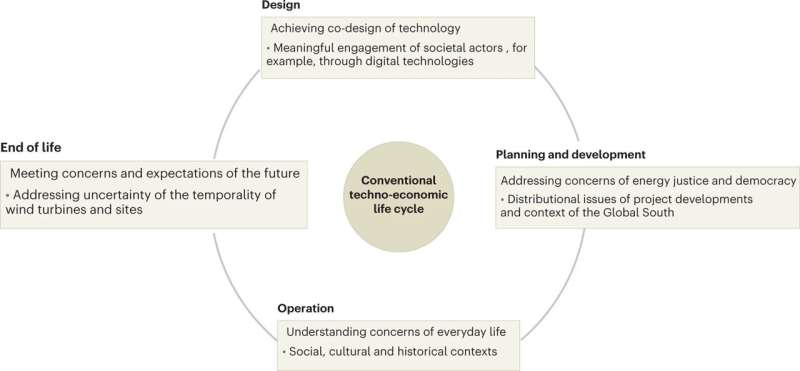This article has been reviewed according to Science X's editorial process and policies. Editors have highlighted the following attributes while ensuring the content's credibility:
fact-checked
peer-reviewed publication
trusted source
proofread
Society's involvement is key in advancing the green energy transition, say researchers

Addressing climate change isn't just a technical issue; it's a societal one. A recent article in Nature Energy highlights the increasing urgency for engineers and social scientists to combine their expertise.
As wind energy emerges as a linchpin in the global push towards a cleaner future, resistance to deploying renewable energy technologies has risen. This underscores the need for a collective socio-technical approach to designing and implementing renewable energy systems.
The recent review paper in Nature Energy promotes an interdisciplinary research approach that bridges technical "grand challenges" with societal dynamics, making renewable energy truly sustainable—technically and socially.
"Today, design decisions are often made without much debate. And when the public then raises concerns, the response is often not taken seriously, or it's too late. Societies, therefore, risk losing public backing to the essential energy transition," says Julia Kirch Kirkegaard, Associate Professor at DTU Wind and Energy Systems and lead author of the article on socio-technical grand challenges in wind energy.
Silo-mentality gets in the way
Addressing the grand challenge of climate change is often done from the perspective of individual technical disciplines. However, this is at the risk of ignoring how technologies—and their design, development, and deployment—are always social. They are set into specific places and contexts and create certain social responses.
With local opposition against renewables rising, the paper states there is an urgent need for interdisciplinary perspectives better to address the socio-technical nature of the energy transition. In other words, to meet global decarbonization goals, the technical sciences need to collaborate more with the social sciences and humanities to engage with—and create value for—local communities and broader society.
The need for increased public participation concerns the planning and development phases and the design and end-of-life phases. In the design phase, in particular, important decisions are made that concern whose interests are considered—and whose aren't. And recent research shows that these decisions even go back to the algorithms found in digital design tools.
There is little doubt that wind power will play a massive role in the future energy system to meet worldwide decarbonization goals. The level of effort that made wind an initial success got us to roughly a 9% share of electricity usage. That will not be sufficient, however, to make the transformative changes required to reach the expected one-third to one-half of total electricity, according to Julia Kirch Kirkegaard.
"Denmark, for instance, is normally seen as a pioneer in wind energy, but only a handful of wind turbines were installed onshore in 2022. With an ambition to produce four times as much solar and wind energy on land and five times as much offshore by 2030, we need to find radically new approaches so that we do not see the controversies simply multiplied," she says.
"While wind turbines are getting larger, and less land is becoming available, local, societal opposition to deployments of new wind energy infrastructure has been growing. We need to understand better and acknowledge why that is so—otherwise, there is a real risk that societies' ability to meet climate ambitions is jeopardized."
A new approach to socio-technical grand challenges
Better recognition of how technical and natural sciences, on the one hand, and state-of-the-art in the social sciences, on the other, address the grand challenges facing wind power is needed since, according to Julia Kirch Kirkegaard, they often do not even agree on the most significant challenges.
The authors warn that the socio-technical research gaps may become grand challenges in their own right if the wind energy sector cannot confront them in due time. Julia Kirch Kirkegaard explains that while it will be a challenge for research, industry and society as a whole to bridge these gaps, the timing for engaging the participants in the deployment of wind energy is obvious:
"Major technological progress is facing growing resistance from the public. Since we'll likely see similar conflicts in the future—as we address other aspects of the energy transition and climate mitigation technologies such as Power-to-X, energy islands and more—the time to explore how to bridge these manifold perspectives is now."
The Nature Energy paper, "Tackling grand challenges in wind energy through a socio-technical perspective," promotes a lens founded in STS (Science & Technology Studies) to push the technical sciences and the state-of-the-art in social sciences and humanities on the issue (i.e., the social acceptance literature) forward and towards more interdisciplinary research:
- Technical sciences need to move beyond their perspective on local opposition as a barrier to be tackled through technical or economic means to appreciate better their role in society and how their design and deployment decisions shape societal dynamics. It might even make it possible to look at public opposition not as something that must be done away with but as a potential for learning and value-creation.
- The state-of-the-art in the social sciences (the social acceptance literature) has tended to focus on the planning and development phases, largely overlooking the technologies themselves, their design, and scientific reasons. With this, they lack an appreciation of how decisions about whose concerns should count (or not) are already made in the design phase. Sometimes making solutions to tackle local opposition in the planning and development phases are in vain and too late.
More information: Julia Kirch Kirkegaard et al, Tackling grand challenges in wind energy through a socio-technical perspective, Nature Energy (2023). DOI: 10.1038/s41560-023-01266-z



















